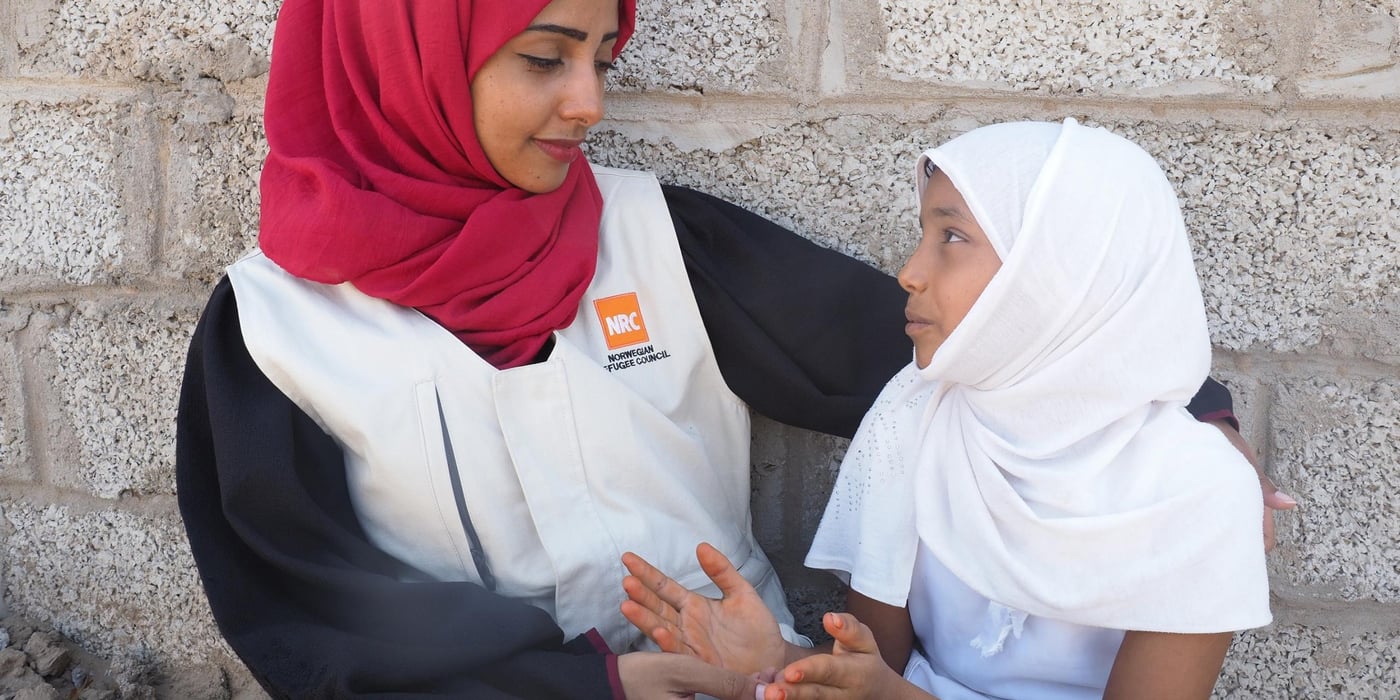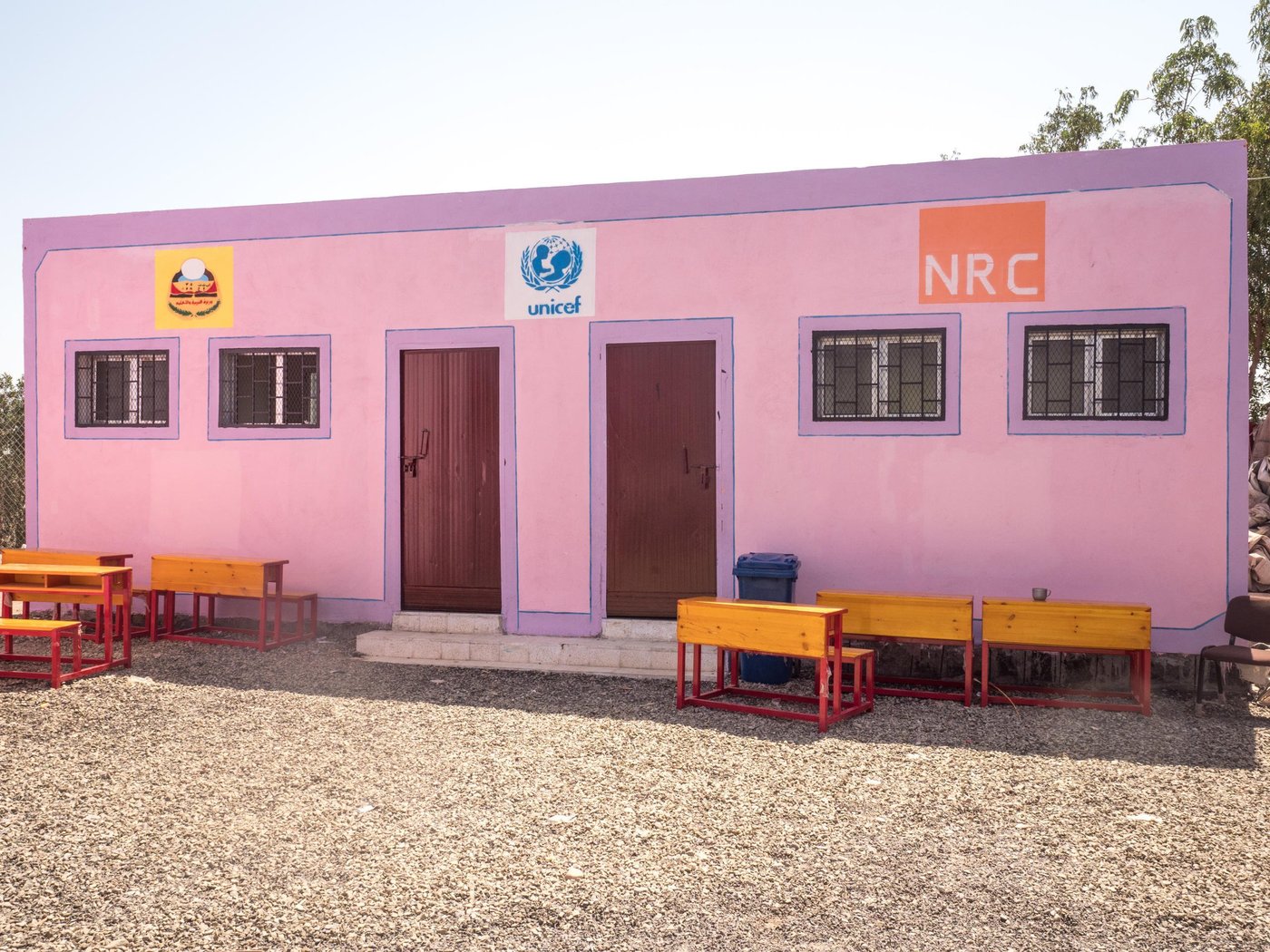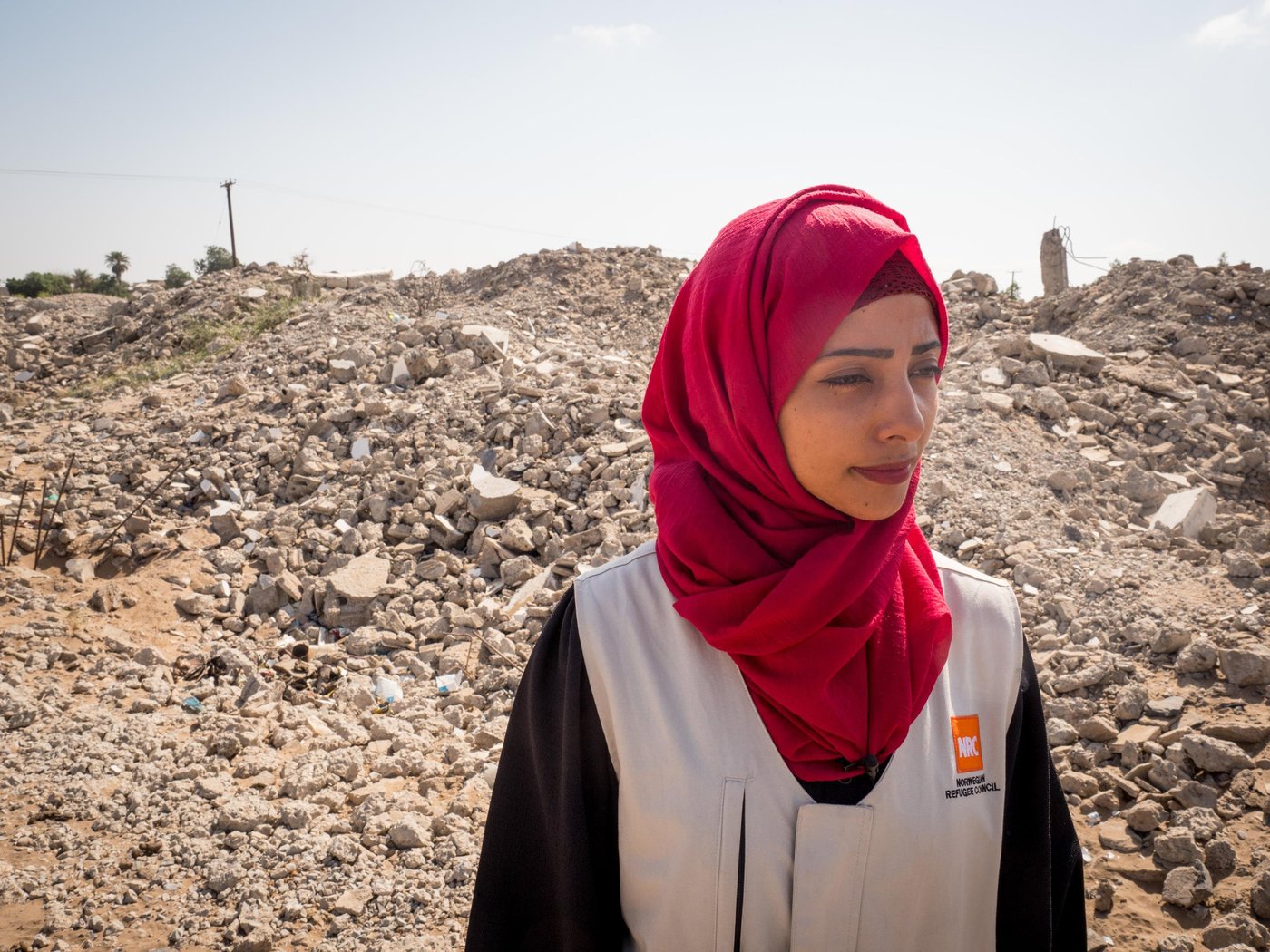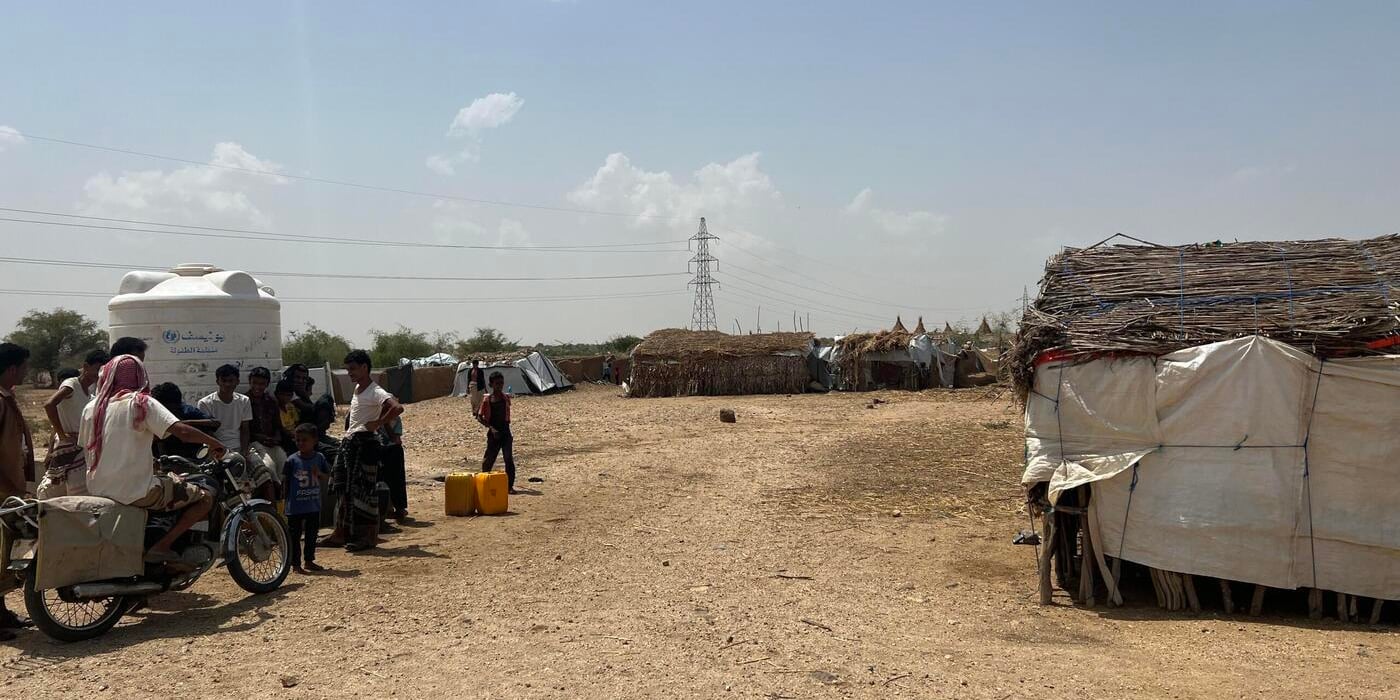
"Going to school in tents was not what I dreamed of. It was like the war was following me everywhere," says 9-year-old Samia. Her classroom was moved into a tent when the school was destroyed by an airstrike.
In January 2019, the Norwegian Refugee Council (NRC), together with UNICEF, built a new school for Samia and her friends. We are working around the clock to ensure that people in Yemen receive food, clean water, shelter and education.

Two million children out of school
In 2015, Ali Abdulaleem elementary school in Lahj governate was destroyed by airstrikes. The remains of the school serve as a harsh reminder of the situation for schoolchildren all over Yemen, where more than two million children lack access to education.
Schools and other learning spaces are being destroyed, occupied by armed groups and used as shelters by people displaced in their own country. Since 18 December alone, 13 schools across the country have been attacked.
For years, local volunteers and teachers did their best to ensure that the children at Ali Abdulaleem could continue their education. They arranged classes in volunteers’ homes and, for over three years, in tents. Classes took place in shifts to make room for all the children.

"We cannot lose education in Yemen"
Samia says that it was impossible to study in such conditions:
"There were too many students, and the hot weather made the tents unbearable."
Together with UNICEF, we recently built a new school with ten classrooms next to the ruins of the old one. In Yemen, we make sure children living amid conflict can still access school. In southern Yemen alone, we’ve rehabilitated 30 schools and built 110 temporary learning spaces. We also distribute school materials, equip learning spaces, train teachers and organise school meals.
"We cannot lose education in Yemen. If we lose education, we can lose a whole generation," says Malka Mohammed, 26, one of our education assistants in southern Yemen. "Education is so important, and that’s why we try to support young Yemenis to create a better life for themselves, and a future."
![Malka Mohammed:
NRC’s education assistant in Aden, Malka Mohammed (26), remembers March, 2015 as a time that turned from being a joyful month of celebrations and weddings into a living nightmare. She was working as an English teacher in her home city of Aden when a colleague ran to her classroom, knocked madly on the door and shouted: “They’re attacking the city!”
“We evacuated the school. There was a lot of confusion. There was shooting everywhere,” she recounts. Over the next few weeks, it got worse and the fighting drew closer to Malka’s home.
“Every day, I heard stories of how people had been killed, and I saw the remains of destroyed buildings. It scared me to death. I was particularly afraid during those early morning hours when the airstrikes would begin.” She remembers one day waking up to the screams of the little girl next door. “I ran out to the street without wearing my abaya or even a scarf on my head. I was running like mad and the street was full of people. It felt like the end of the world, the sky was covered in red lightening.”
Malka and her mother ran as fast as they could. They eventually reached a house at which they felt safe and were welcomed in by the people living there. They stayed until the next morning.
A stranger helped Malka that day. Now, she is helping others.
As an education assistant in southern Yemen, her job is to make sure children living in conflict can still access school. Through our education work, we rehabilitate and rebuild schools destroyed by shelling and other attacks, we distribute school materials, teach teachers and organise school meals.
“We cannot lose education in Yemen. If we lose education, we can lose a whole generation,” she says, and continues: “Education is so important, and that’s why we try to support young Yemenis to create a better life for themselves, and a future.”
Yasin Ismail:
Yasin Ismail has been working for NRC for five years and believes NRC is one of the best organisation to work for. Yasin started working for NRC as an education assistant and is now an education coordinator at NRC's Aden area office.
Yasin believes education is a critical component of the workNRC does, because of its great impact on people’s lives. He recognises it as a basic human right, important to the development of children and youth to fulfil their potential, and critical to breaking the intergenerational cycle of poverty.
The impact of the conflict in Yemen has been catastrophic. Schools have been destroyed or occupied by armed groups or displaced populations, which have deprived children in some areas from accessing school for more than four years.
Children in Yemen are struggling to cope with the violence they have faced during the conflict, and continue to face imminent danger as conflict carries on and exposes them to UXOs, mines and crossfire.
Yasin believes the security situation, which results in restricted access and unpredictable funding for education, are two of the main challenges in his job. He said that affected communities need access to aid but will sometimes have challenges accessing this due to long delays at checkpoints or challenges reaching distribution sites.
Yasin wants to help and support those affected by war in Yemen and believes that we can change the world with education. “[We should] Always follow our dreams and believe in ourselves. For every ending - there is a new beginning, for every memory - there is a dream ahead.”
"I hope for peace and stability for our people and country. I hope for our children and youth to get quality education because that will help them to build their future. I believe the education is the only approach to protect future generations, because it gives people a chance for healthy development, restores a sense of normality, and provides important life skills. Further to that, an education intervention is an investment in the long-term future, and in the peace, stability and economic growth of Yemen”.
More information:
These kids, like many others, leave for school very early because it takes them an hour - or as long as two hours for some - to walk! Ensuring children have sufficient access to nutrition is very important for children expending huge amounts of energy on commuting, learning and playing, and ensures they are able to engage appropriately in class. Lialy was among the children without anything to eat before coming to school. NRC has started to provide high energy biscuits to children in Lialy's schooll, who expressed their happiness at receiving the biscuits. Several children mentioned feeling more energetic and active as a result, and said they could concentrate more in class.
Info about the school:
Al-Qadisia school is located in Al-Qubbiyta district in Lahj and was one of the first schools in which NRC has delivered programs. NRC's team describe the AlQadisia as a normal school with an engaged community but problems including nearby landmines. As displaced families continue to move into the area, the number of students at the school continues to grow, creating congestion. NRC's program at is supporting rehabilitation of the school building, distribution of recreational, cleaning and scholastic materials, capacity building of teachers and provision of high energy biscuits for students.
Education in H2R:
One of NRC’s global priorities is to deliver aid and services to people in hard to reach areas. We worked with the Education department to select this school and others identified as being among the most in need. In travelling to the school form NRC's office in Aden, staff encounter several checkpoints, threatened areas and landmines.
Our programming in Yemen's southern governorates reaches people in Lahj, Abyan and Al-Dalea, among other areas. Operating in these areas is complicated and challenging: our staff travel through hostile checkpoints, some of which return traffic, preventing access to project sites. Several areas remain affected or threatened by conflict, explosions are often heard, landmines dot areas across Yemen and bureaucratic challenges delay or complicate processes.
Where mines do explode, civilians can be punished severalfold as people can not only sustain injuries, but lose mobility and access to fields and other sites used for cultivation.
Efforts should be made to call on the authorities and specialised organisations to strengthen demining operations and reduce the number of civilian casualties.
Photo: Ingrid Prestetun/NRC](/cdn-cgi/image/width=1400,format=auto,fit=crop,height=1050/globalassets/images/countries/yemen/aden-2019/malka-/p2250859.jpg)


